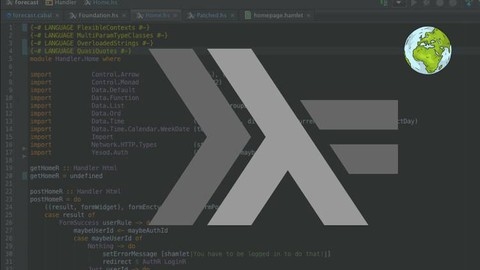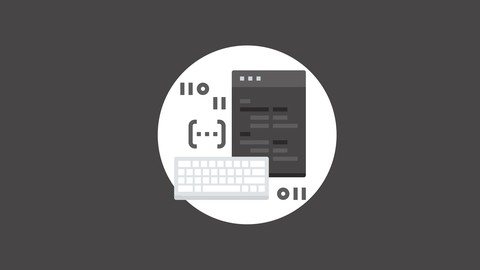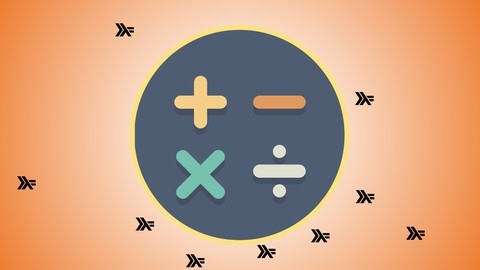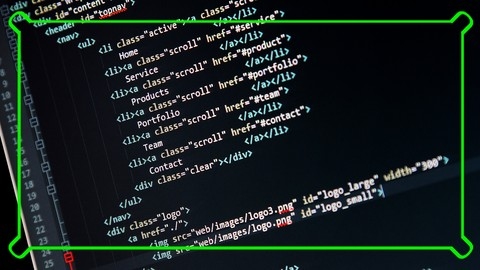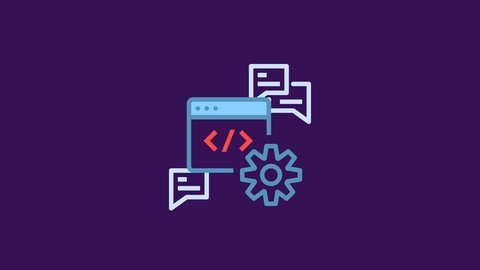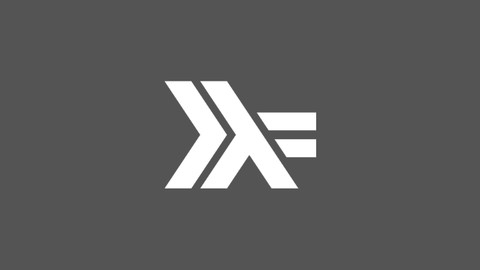Haskell is a powerful functional programming language known for its elegance, expressiveness, and strong type system.
It’s a favorite of many programmers for its ability to write concise, reliable code, and for its support for advanced concepts like lazy evaluation and monads.
Mastering Haskell can open doors to exciting career opportunities in fields like web development, data science, and financial engineering, allowing you to build robust and highly performant applications.
Finding the right Haskell course on Udemy can be a daunting task.
There are so many options, it’s hard to know which one will actually teach you the skills you need.
You want a course that’s engaging, comprehensive, and taught by experienced instructors, but also fits your learning style and goals.
We’ve done the research and we’re confident that Learning Path: Haskell: Functional Programming and Haskell is the best Haskell course overall on Udemy.
This course stands out for its practical approach, teaching you Haskell fundamentals alongside building a real-world application – a word game grid.
You’ll learn how to set up your development environment, write concise code, and use powerful Haskell concepts like pattern matching, algebraic data types, and monads.
It’s a great choice for beginners and experienced programmers alike.
If you’re looking for something more specialized, or if “Learning Path: Haskell: Functional Programming and Haskell” doesn’t quite meet your needs, don’t worry!
Keep reading for our full list of recommendations, and find the perfect Haskell course to take your programming skills to the next level.
Learning Path: Haskell: Functional Programming and Haskell
This course starts by covering the fundamentals, helping you grasp the core concepts of Haskell and functional programming.
You’ll learn how to install the necessary tools like Stack on different operating systems like Windows, Mac OS, and Linux.
The course dives into the unique features of Haskell, such as algebraic data types, pattern matching, and type classes, through hands-on examples and exercises.
Once you have a solid foundation, the course walks you through building a real-world project - a word game grid.
You’ll learn how to set up the project using Stack, implement the game logic with functions and data structures, and even write unit tests with Hspec.
It takes you deeper into advanced Haskell concepts like handling side effects with IO, exception handling, and using monads like the Free Monad.
You’ll explore techniques for streaming data, both pure and effectful, and learn about push and pull-based approaches.
The course also covers concurrent and parallel programming in Haskell.
You’ll learn how to use tools like IVars, LVars, and MVars for deterministic communication and collaboration.
It even touches on distributed concurrent programming with Cloud Haskell and handling eventual consistency with CRDTs.
Throughout the course, you’ll work with various libraries and tools like GHCi, Lazy IO, Lazy Lists, Free Applicative, ContT, Async, and forkIO.
The course emphasizes writing precise types, defining program boundaries, and even explores microservices and optimizing requests with Haxl.
Learning Haskell Programming
The course starts by guiding you through the installation and setup process for Haskell.
You’ll learn how to install Haskell on your operating system, whether it’s OS X, Windows, or Linux.
The instructions are clear and straightforward, making it easy for you to get started with the language.
Once you have Haskell installed, the course dives into the basics of the language.
You’ll discover Haskell with ghci, the interactive environment for Haskell, and learn about built-in data structures.
You’ll also get familiar with editing Haskell source code and writing your first functions.
As you progress, you’ll learn how to build your own data structures and use pattern matching, a powerful feature of Haskell.
To solidify your understanding, you’ll develop a word game project using the Stack build tool.
The course walks you through setting up the word game grid, searching for words in different directions, and implementing unit testing with Hspec to ensure your code works as expected.
You’ll learn about grid coordinates, infinite lists, and recursive searching algorithms, all while building a fully functional word game.
Along the way, you’ll gain experience with Haskell’s functional programming paradigm, which emphasizes immutable data and pure functions.
The course polishes off the word game by adding features like randomly generating characters in the grid and highlighting found words.
You’ll gain practical experience with Haskell’s syntax, data structures, and functional programming concepts, setting you up for further exploration of this powerful language.
The Complete Haskell Course: From Zero to Expert!
You’ll start by learning the basics of Haskell, including its fundamentals, types, and tools.
From there, you’ll dive into functions, tuples, and lists, exploring how to work with them and solving practical problems along the way.
The course then moves on to higher-order functions, which are a powerful feature of Haskell.
You’ll learn about anonymous functions and sections, and solve various problems using these concepts.
Additionally, you’ll explore infinite lists and learn how to work with them.
The course also covers important data structures like binary trees, multiway trees, and graphs.
You’ll learn the fundamentals of these structures and solve problems related to them, such as tree traversal, isomorphism, and depth-first search.
As you progress, you’ll delve into advanced topics like functors, applicatives, and monads.
These are essential concepts in Haskell that will help you write more expressive and concise code.
The course also covers the state monad, which is useful for managing state in functional programming.
Input and output are also covered, allowing you to work with user input and output data.
You’ll solve practical problems related to input and output, such as sorting and filtering data based on user input.
Finally, the course includes a section on final exams, where you’ll put your knowledge to the test by solving various problems in Haskell.
This will help you solidify your understanding of the concepts covered throughout the course.
Haskell Programming
The course starts by introducing you to Haskell and guiding you through the installation process.
Once you have Haskell set up, you’ll dive into the fundamentals of the language, covering functions, let bindings, and if statements.
This lays a solid foundation for working with Haskell’s core constructs.
Next, you’ll explore lists, a fundamental data structure in Haskell.
You’ll learn how to create, manipulate, and work with lists using various techniques, including list comprehensions for both numbers and strings.
This section also contrasts tuples with lists, helping you understand their differences and use cases.
Building on your knowledge of lists, the course dives deeper into functions.
You’ll learn about recursion, a powerful technique for solving problems in Haskell.
Additionally, you’ll be introduced to modules, which allow you to organize and reuse code effectively.
The course then covers higher-order functions, a core concept in functional programming.
You’ll learn how to pass functions as arguments to other functions and how to create new functions on the fly using lambda expressions.
This section also introduces foldl, a higher-order function that allows you to perform operations on lists in a concise and efficient manner.
Towards the end, you’ll learn how to define your own custom data types in Haskell.
This is a crucial skill for building complex applications and modeling real-world entities within your programs.
Throughout the course, you’ll work with Haskell’s core language features, such as functions, lists, tuples, let bindings, if statements, modules, lambda expressions, and foldl.
These concepts are woven into the curriculum, ensuring you gain practical experience with them while learning Haskell.
Haskell: Data Analysis Made Easy
You’ll start by learning how to install Haskell and set up your development environment on different operating systems.
Once you have Haskell up and running, you’ll dive into the basics of the language, including functions, data structures, and pattern matching.
From there, the course will teach you how to work with real-world data formats like CSV files and SQLite3 databases.
You’ll learn techniques for cleaning and preprocessing data, including using regular expressions to handle structured and unstructured datasets.
The course covers various data analysis techniques, such as calculating descriptive statistics, data visualization, kernel density estimation, and hypothesis testing.
You’ll also learn about regression analysis, including linear, logarithmic, and polynomial regression, as well as multiple regression and correlation coefficients.
Moving beyond traditional data analysis, the course delves into text analysis, covering topics like n-grams, cosine similarity, and TF-IDF.
You’ll also explore clustering algorithms, including k-means and hierarchical clustering.
The course introduces you to the powerful concept of Naïve Bayes classification, which has applications in areas like spam filtering and sentiment analysis.
You’ll also learn about principal component analysis (PCA), a dimensionality reduction technique used in fields like image processing and bioinformatics.
Finally, the course covers the development of a recommendation engine, a valuable skill in today’s data-driven world.
Throughout the course, you’ll have opportunities to test your knowledge and apply what you’ve learned through hands-on exercises and projects.
Haskell for Beginners (programming language)
This course starts by introducing you to the basics of Haskell programming, including “Hello World”, math operations, and modules.
You’ll learn how to use Replit, an online coding environment, to write and run your Haskell code.
Next, you’ll dive into data structures like lists, records, and tuples.
Lists are ordered collections of elements, while records and tuples allow you to group related data together.
The course then covers functions, which are the building blocks of Haskell programs.
You’ll learn how to define and use functions, as well as how to work with conditionals (if-else statements) to control the flow of your program.
Getting user input is an essential skill for building interactive programs, and this course will teach you how to do that in Haskell.
Finally, you’ll explore recursion, a powerful technique for solving problems by breaking them down into smaller instances of the same problem.
Throughout the course, you’ll practice writing Haskell code using the concepts you’ve learned, such as lists, functions, conditionals, and recursion.
Learning Path: Haskell: Functional Programming in Haskell
This course starts by introducing you to the fundamentals of Haskell, including its syntax, data types, and type classes.
You’ll learn how to install the necessary tools like Stack on different operating systems like Windows, Mac OS, and Linux.
The course then dives into the core concepts of functional programming and how Haskell embraces this paradigm.
You’ll write your first Haskell programs, understand pattern matching, and learn to debug using GHCi, the interactive Haskell environment.
But the real value lies in building a practical application from scratch.
You’ll create a command-line to-do list application, learning how to parse command-line options, handle file I/O, work with strings and YAML data, and implement various features like creating, updating, and deleting tasks.
Along the way, you’ll explore advanced topics like applicative functors, algebraic data types, and laziness in Haskell.
The course also touches on the vast ecosystem of Haskell packages and how to effectively search and use them in your projects.
Writing Haskell Programs
The course starts by introducing the edit, build, execute, and test cycles, giving you a solid foundation for developing Haskell programs.
You’ll dive into Cabal files, which are crucial for managing dependencies and building Haskell projects.
The course also provides an in-depth look at Stack, a popular tool for managing Haskell projects and dependencies.
You’ll learn how to use Stack effectively, including hints and tips for optimizing your workflow.
Modules are a core concept in Haskell, and the course dedicates several sections to understanding them.
You’ll learn how to create, consume, and organize modules effectively, which is essential for writing modular and maintainable code.
One of the strengths of Haskell is its rich ecosystem of packages.
This course covers packages and repositories in detail, teaching you how to search for, navigate, and consume third-party packages.
You’ll even get a brief tour of some of the most popular packages used for common programming tasks.
Haskell Exercises for Beginners
The course starts with an introduction, ensuring you have a solid foundation before diving into the material.
You’ll then tackle basic I/O concepts through a series of questions and solutions, allowing you to apply what you’ve learned immediately.
As you progress, you’ll explore variables, a crucial aspect of any programming language.
The course presents questions to test your understanding, followed by detailed solutions to reinforce the concepts.
Similarly, you’ll delve into functions, a fundamental building block of Haskell programming, with hands-on exercises and solutions.
One of the highlights of this course is the dedicated section on Exercise Arrays/Lists.
You’ll work through multiple questions and solutions, gaining practical experience in manipulating and working with these data structures in Haskell.
Throughout the course, you’ll encounter quizzes that assess your comprehension of the topics covered.
These quizzes serve as checkpoints, ensuring you’re grasping the material before moving forward.
The course concludes with more exercises, allowing you to further solidify your understanding and apply the skills you’ve acquired.
Master Haskell from Scratch- A Basic to Advanced Course
You’ll start with an introduction to functional programming and how Haskell addresses certain problems.
After installing Haskell on Linux, you’ll dive into the basics like data models, first programs, and whitespace layout.
The course then takes you through interactive Haskell with GHCi, covering operators, decision-making, types, functions, modules, and I/O.
You’ll also explore advanced concepts like functors, monads, zippers, and debugging with GHCi.
To solidify your learning, you’ll create a word game grid project using Stack.
You’ll set up the grid, implement word searching in all directions, and write unit tests with Hspecs.
The course dives deeper into grid coordinates, infinite lists, recursive searching, and making the game playable.
You’ll compare Haskell with Python and leverage Haskell’s strengths in solving problems.
